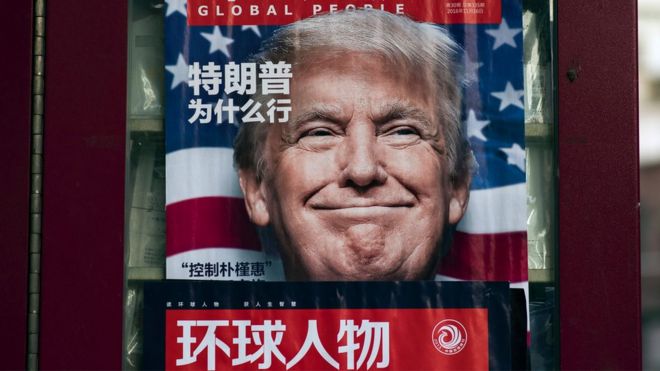
A cold view of the world.
The market is already globalized, so the use of a border tax to segment the market is essentially to create a bottomless chasm, an abyss.
On his first working day after taking office, Trump not only signed an executive order to decidedly leave the Trans-Pacific Partnership, but also met and discussed with some of those in charge of big corporations, warning that either production by these multinational businesses would need to return to the United States or the government would impose a very high tariff on imports. Trump also suggested that these businessmen communicate with the states to locate suitable production sites. Of course, besides a big stick, Trump also promised a carrot—the cutting of regulations by more than 75 percent. Would the border tax ultimately wake the American economy to bring hope or would it create a barrier? In my opinion, this is just Trump digging a gulf.
The conversation with the businessmen signified that Trump’s border tax was not a joke but an actuality. His policy even earned support from the chief tax policy-maker in Congress. The idea of free trade, or at least the current policy of free trade in the U.S., has been abandoned by Trump. Trump even claimed during his inauguration speech that protection could bring about prosperity. Therefore, the border tax is not merely a scare tactic but could very likely be implemented in a short period of time.
Prior to taking office, Trump attacked many companies on Twitter, including Ford and Toyota. These companies obediently decided to produce cars in the U.S. instead of Mexico. However, there are those who are less obedient, such as Germany’s BMW. Can a border tax allow for the revival of the U.S. manufacturing industry? No one knows the answer, but Trump believes so. To revive the U.S. economy, it is necessary to buy American goods and hire American people. This is the fundamental point of Trump’s economics. Trump will do whatever benefits the realization of this goal.
Trump’s policies have encountered opposition by some importers because U.S. corporations require global purchases. Now is the era of supply chain cooperation. And as the U.S. builds a wall and shuts itself up in a dark house, something still lingers: how does one differentiate between what is American and what is foreign? The market is already globalized, so the use of a border tax to segment the market is essentially to create a bottomless chasm, an abyss. Unless the United States fully realizes the internalization of its supply chain, which is almost impossible.
Border taxes benefiting the U.S. manufacturing industry and its recovery do not only scare certain companies but also cause worries over a tariff war. Trump’s tariff wall is not, however, mainstream—it is a retreat from multilateral trade frameworks and goes against globalization—and the majority of countries are still observing Trump. If Trump’s nonsense policy becomes a reality, it will essentially be a beggar-thy-neighbor policy, waiting for his own trading partners to be imperiled, or perhaps even giving them a push toward it. Win-win cooperation becomes a zero-sum game, and a tariff war is not unreasonable.
A big stick like the border tax should not be raised easily. Trump’s opponent is not necessarily the one who will ultimately turn black and blue. To a businessman, a carrot—like infrastructure investment, tax cuts, business environment improvements, etc.—is more appealing. Not only is it Trump’s trump card, but it can also realize the fundamental point of Trump’s economics. However, to achieve these ends is very difficult, and seeing results during the four-year term is even more difficult. Therefore, the border tax has become a possibly fast-acting, palliative drug, if one with a large side-effect profile.
The United States has been pursuing a type of open international economic policy since the end of World War II. Now, Trump is basically abandoning this economic policy and ignoring everyone else. However, the world is not just the United States. While Trump is carving out a chasm, others can simply make a detour.

Leave a Reply
You must be logged in to post a comment.